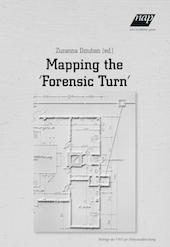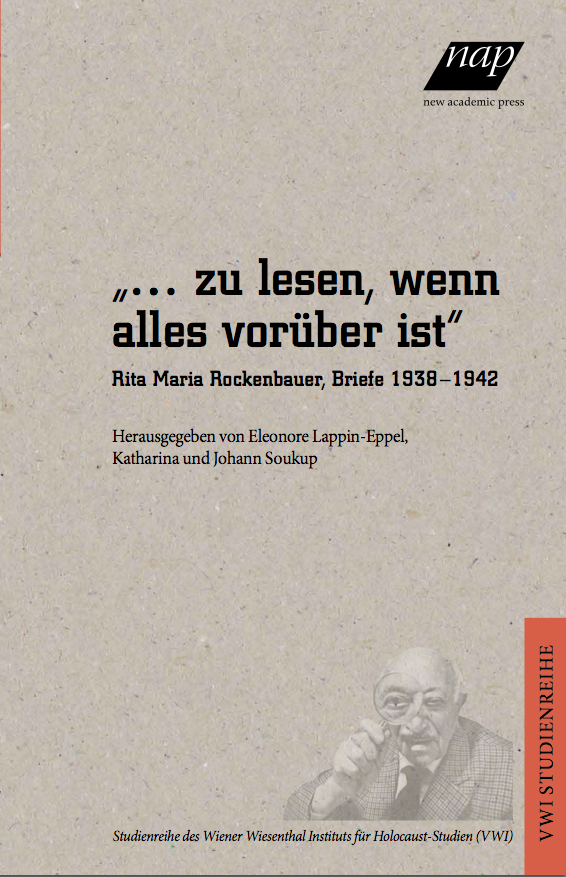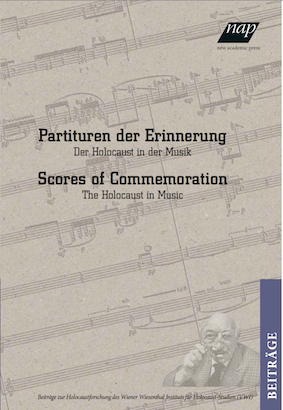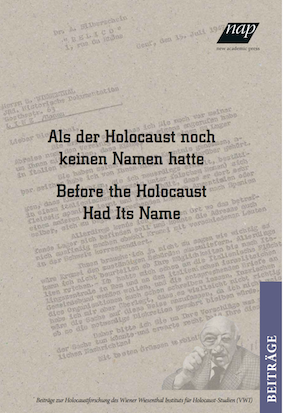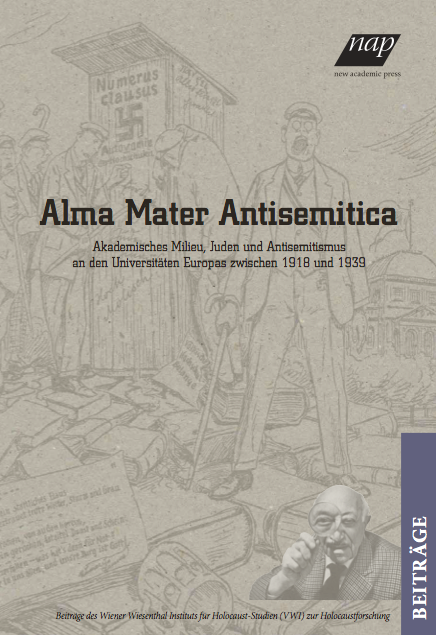 There is a paradox saying in contemporary Russia that a country's past cannot be predicted: the image of the Russian or Soviet past is always influenced by the interpretation of the current political situation. In order to be able to understand why Russia is once again in the smothering hold of an “unpredictable past” and why one's attitude to Stalin is still, 62 years after his death, the sole measure for a person's position on democracy and liberal values, we must take a closer look at the social conditions during the second half of the 1980s. This paper addresses that task. Its particular focus is the construction of an official state ideology from contradictory historical images by the ruling elites in contemporary Russia.
There is a paradox saying in contemporary Russia that a country's past cannot be predicted: the image of the Russian or Soviet past is always influenced by the interpretation of the current political situation. In order to be able to understand why Russia is once again in the smothering hold of an “unpredictable past” and why one's attitude to Stalin is still, 62 years after his death, the sole measure for a person's position on democracy and liberal values, we must take a closer look at the social conditions during the second half of the 1980s. This paper addresses that task. Its particular focus is the construction of an official state ideology from contradictory historical images by the ruling elites in contemporary Russia.
Editorial
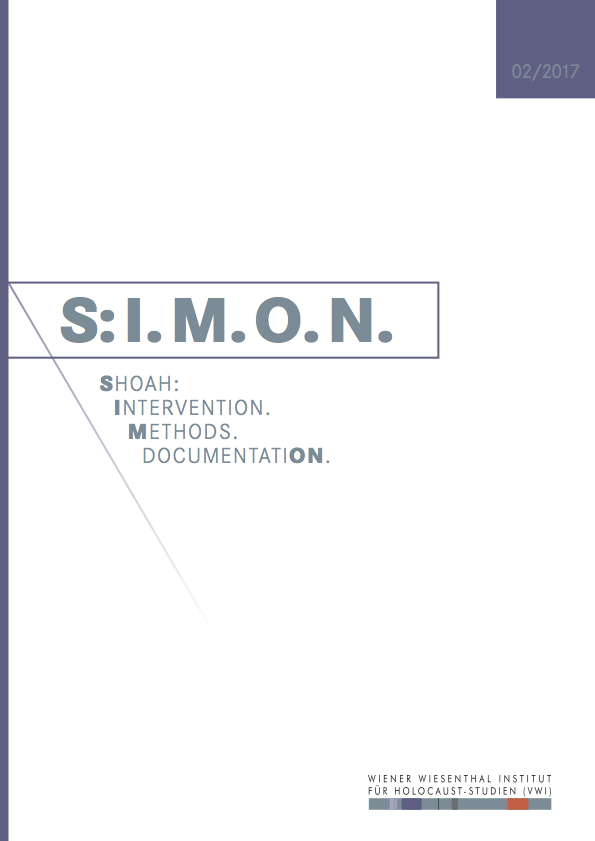 S:I.M.O.N. is an e-journal of the Vienna Wiesenthal Institute for Holocaust Studies (VWI). It appears twice a year in English and German language. S:I.M.O.N. aims at both a transnational and comparative history of the Holocaust and Jewish Studies in Central and Eastern Europe within the broader contexts of the European history of the 20th and 21st century, including its prehistory, consequences and legacies as well as the history of memory.
S:I.M.O.N. is an e-journal of the Vienna Wiesenthal Institute for Holocaust Studies (VWI). It appears twice a year in English and German language. S:I.M.O.N. aims at both a transnational and comparative history of the Holocaust and Jewish Studies in Central and Eastern Europe within the broader contexts of the European history of the 20th and 21st century, including its prehistory, consequences and legacies as well as the history of memory.
S:I.M.O.N. serves as a forum for discussion of various methodological approaches. The journal especially wishes to strengthen the exchange between researchers from different scientific communities and to integrate both the Jewish history and the history of the Holocaust into the different “national” narratives. It also lays a special emphasis on memory studies and the analysis of politics of memory. S:I.M.O.N. uses a double-blind review system, which means that both the reviewer’s and the author’s identities are concealed from each other hroughout the review process.
Shoah: The journal deals with the history of the Shoah from multidisciplinary, transnational and comparative perspectives. It seeks to integrate studies on Jews as well as on other groups of victims of the Holocaust, especially on Roma, and of so far less researched regions of (East) Central and (South) Eastern Europe.
Intervention. The journal reports on research projects and their transmission into public events. It also informs about current educational and remembrance programs.
Methods. The journal serves as a forum for the discussion of methodological approaches as, for instance, the everyday history, oral history, gender history, the history of violence, anti-Semitism and racism and the theory of memory and memory politics.
DocumentatiON. The journal contributes to critical approaches on using and interpreting archival materials in the 21st century.
Download the current issue S:I.M.O.N. 2017/2.
Articles
Miloslav Szabó
Auf dem Weg zum Holocaust? Der slowakische Antisemitismus in der Ersten Tschechoslowakischen Republik
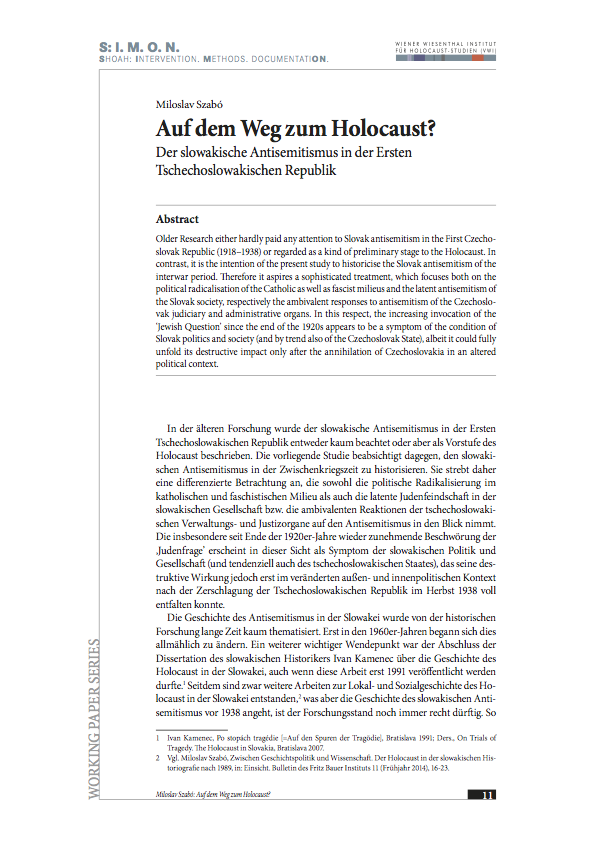 Older Research either hardly paid any attention to Slovak antisemitism in the First Czechoslovak Republic (1918–1938) or regarded as a kind of preliminary stage to the Holocaust. In contrast, it is the intention of the present study to historicise the Slovak antisemitism of the interwar period. Therefore it aspires a sophisticated treatment, which focuses both on the political radicalisation of the Catholic as well as fascist milieus and the latent antisemitism of the Slovak society, respectively the ambivalent responses to antisemitism of the Czechoslovak judiciary and administrative organs. In this respect, the increasing invocation of the 'Jewish Question' since the end of the 1920s appears to be a symptom of the condition of Slovak politics and society (and by trend also of the Czechoslovak State), albeit it could fully unfold its destructive impact only after the annihilation of Czechoslovakia in an altered political context.
Older Research either hardly paid any attention to Slovak antisemitism in the First Czechoslovak Republic (1918–1938) or regarded as a kind of preliminary stage to the Holocaust. In contrast, it is the intention of the present study to historicise the Slovak antisemitism of the interwar period. Therefore it aspires a sophisticated treatment, which focuses both on the political radicalisation of the Catholic as well as fascist milieus and the latent antisemitism of the Slovak society, respectively the ambivalent responses to antisemitism of the Czechoslovak judiciary and administrative organs. In this respect, the increasing invocation of the 'Jewish Question' since the end of the 1920s appears to be a symptom of the condition of Slovak politics and society (and by trend also of the Czechoslovak State), albeit it could fully unfold its destructive impact only after the annihilation of Czechoslovakia in an altered political context.
SWL-Reader
Nóra Berend
Jews and the Hungarian State. Integrative and Exclusionary Models from Medieval to Modern Times
 In Hungary, official memory and history discourses often distinguish between ‘Jews’ and ‘Hungarians’, harking back to the Horthy-era concept of the ‘Christian national’ state. This dichotomy clashes with modern ideas of citizenship and acts as a carrier of antisemitism. This lecture analyses the role of political authority in fostering integration or exclusion over a long time span. It begins with the attitudes of those holding political power in the Kingdom of Hungary in the Middle Ages, when the distinction between Jews and Christians was based on religious affiliation. In particular, two processes will be examined: one leading to increased integration, granting protection and rights, and the other promoting segregation, demonisation and hostility. The lecture will then focus on key moments in modern history, exploring the functions of these two contradictory but related processes. It will finally tackle the question of the role of the state in (dis)continuities between medieval exclusion and modern antisemitism.
In Hungary, official memory and history discourses often distinguish between ‘Jews’ and ‘Hungarians’, harking back to the Horthy-era concept of the ‘Christian national’ state. This dichotomy clashes with modern ideas of citizenship and acts as a carrier of antisemitism. This lecture analyses the role of political authority in fostering integration or exclusion over a long time span. It begins with the attitudes of those holding political power in the Kingdom of Hungary in the Middle Ages, when the distinction between Jews and Christians was based on religious affiliation. In particular, two processes will be examined: one leading to increased integration, granting protection and rights, and the other promoting segregation, demonisation and hostility. The lecture will then focus on key moments in modern history, exploring the functions of these two contradictory but related processes. It will finally tackle the question of the role of the state in (dis)continuities between medieval exclusion and modern antisemitism.
Events
Miloslav Szabó
Ein ‚antislowakischer' Oscar-Film? Zur Darstellung des Holocaust im tschechoslowakischen Film Obchod na korze
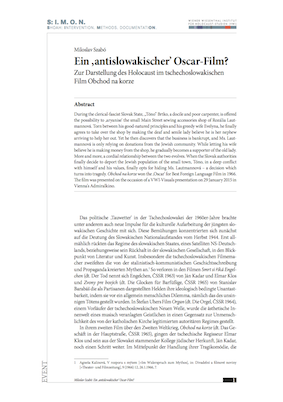 During the clerical-fascist Slovak State, "Tóno" Brtko, a docile and poor carpenter, is offered the possibility to 'aryanise' the small Main Street sewing accessories shop of Rozália Lautmannová. Torn between his good-natured principles and his greedy wife Evelyna, he finally agrees to take over the shop by making the deaf and senile lady believe he is her nephew arriving to help her out. Yet he then discovers that the business is bankrupt, and Ms. Lautmannová is only relying on donations from the Jewish community. While letting his wife believe he is making money from the shop, he gradually becomes a supporter of the old lady. More and more, a cordial relationship between the two evolves. When the Slovak authorities finally decide to deport the Jewish population of the small town, Tóno, in a deep conflict with himself and his values, finally opts for hiding Ms. Lautmannová – a decision which turns into tragedy. Obchod na korze won the 'Oscar' for Best Foreign Language Film in 1966. The film was presented on the occasion of a VWI-Visuals presentation on 29 January 2015 in Vienna's Admiralkino.
During the clerical-fascist Slovak State, "Tóno" Brtko, a docile and poor carpenter, is offered the possibility to 'aryanise' the small Main Street sewing accessories shop of Rozália Lautmannová. Torn between his good-natured principles and his greedy wife Evelyna, he finally agrees to take over the shop by making the deaf and senile lady believe he is her nephew arriving to help her out. Yet he then discovers that the business is bankrupt, and Ms. Lautmannová is only relying on donations from the Jewish community. While letting his wife believe he is making money from the shop, he gradually becomes a supporter of the old lady. More and more, a cordial relationship between the two evolves. When the Slovak authorities finally decide to deport the Jewish population of the small town, Tóno, in a deep conflict with himself and his values, finally opts for hiding Ms. Lautmannová – a decision which turns into tragedy. Obchod na korze won the 'Oscar' for Best Foreign Language Film in 1966. The film was presented on the occasion of a VWI-Visuals presentation on 29 January 2015 in Vienna's Admiralkino.
Irina Scherbakowa: Erinnerung versus Verdrängung am Beispiel Russland. Vom schwierigen Umgang mit der Vergangenheit
„... zu lesen, wenn alles vorüber ist“
Rita Maria Rockenbauer, Briefe 1938 –1942
Wien 2014
Partituren der Erinnerung.
Der Holocaust in der Musik
Scores of Commemoration.
The Holocaust in Music
Wien 2015
Before the Holocaust Had Its Name. Early Confrontations of the Nazi Mass Murder of the Jews
Wien 2016
Akademisches Milieu, Juden und Antisemitismus an den Universitäten Europas zwischen 1918 und 1939
Academic Milieu, Jews and Antisemitism at European Universities between 1918 and 1939
Wien 2016


